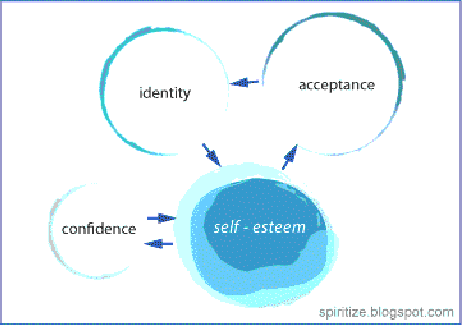
Life Skills Topic 8
SELF ESTEEM
Concept of Self-esteem
The Meaning of Self-esteem
Explain the meaning of self-esteem
People with appropriate levels of self-esteem are assured in their right
to feel worthy, enjoy the fruits of their efforts, and assert their
needs and wants.
Self-esteem, is the awareness that we are equal to the obstacles placed in front of us.
"The most difficult phase of life is not when no one understands you. It is when you don't understand yourself."
If you are not happy or satisfied with your life for reasons you can't
pinpoint specifically, it's probably because your self-esteem might be
in the low phase. Low self esteem can make you blame yourself for things
that aren't your fault; underestimate your abilities, and make you a
pessimist. Self-esteem plays a role in almost everything you do.
Self-esteem is often confused with self-confidence. Self-confidence is
the knowledge that one can succeed at something – studies, career, goal
etc. Self-esteem, on the other hand, is the capacity to like and love
one self; and feel worthwhile, irrespective of all the ups and downs of
life.
Someone with a healthy self-esteem simply likes himself or herself. A
healthy self-esteem is not contingent on success because there are
always failures to contend with. Neither is it a result of comparing
ourselves with others because there is always someone better. With a
healthy self-esteem, we like ourselves because of who we are and not
because of what we can or cannot do or what others think of us.
While lacking among far too many people in our society, self-esteem is
not merely a luxury- it is a need. A need is something we require to
function effectively. We do not merely want food and water, we need
them; without them, we die.
At the same time, we have other nutritional needs (such as the need for calcium) with less dramatic impacts on our lives.
Self-esteem is a need analogous to calcium, rather than food or water.
Lacking it to a serious degree, we do not necessarily die, but we are
impaired in our ability to function. We may not need self-esteem to
survive, but we do need it to thrive.
To say that self-esteem is a need is to say that it makes an essential
contribution to the life process. That it is indispensable to normal and
healthy development. That it has survival value.
Self-esteem, fully realized, is the awareness that we are equal to the
obstacles placed in front of us. Self-esteem is confidence in our
ability to think, confidence in our ability to cope with the basic
challenges of life, and confidence in our right to be successful and
happy. People with appropriate levels of self-esteem are assured in
their right to feel worthy, enjoy the fruits of their efforts, and
assert their needs and wants.
Self-esteem is not merely a luxury- it is a need. A need is something we
require to function effectively. We do not merely want food and water,
we need them; without them, we die.
We may not need self-esteem to survive, but we do need it to thrive.
To say that self-esteem is a need is to say that it makes an essential
contribution to the life process. That it is indispensable to normal and
healthy development that it has survival value.

Self-esteem is the foundation of our personality, a fundamental essence
that defines everything about us. Self-acceptance and our personal
identity together constitutes our self-esteem
The Importance of Good Self-esteem
The Importance of Good Self-esteem
Explain the importance of good self-esteem
The importance of good self esteem are as follows;
Self-Acceptance
Self-acceptance is not a denial of a need for change or improvement - it
is simply a recognition of who we are. As Dr. David D Burns says, "We
need to learn to accept and love ourselves as a flawed and imperfect
human. We need to accept our strengths as well as our weakness without a
sense of shame or embarrassment."
It is foolish to deny our shortcomings since it helps us to empathize
and connect with others. After all, for example, if you've never felt
embarrassed or foolish how can you genuinely care for and understand
someone who has? If you feel ashamed of certain feelings and avoid or
try to repress them, how do you think you will react to those feelings
from someone else? Our personal identity develops from self-acceptance.
This is why self-acceptance is at the core, and the first and most
important step we need to take to enhance our self-esteem.
Personal Identity
What we think about ourselves, our self-image or personal identity, is
also very important to our core of existence. It is our cultural and
personal values, beliefs and philosophy by which we define our personal
worth; it influences how we evaluate ourselves and others.
As mentioned before, self-confidence is knowledge and mastery of skills.
In today's westernized culture, self-confidence does affect our
personal identity (and thus self-esteem). But self-esteem plays a more
dominant role in influencing the other.
Self-esteem isn't constant; it fluctuates - it is not an either / or
proposition. There is high self-esteem and there is low self-esteem, and
many gradations in between.
Self-Esteem and Behavior
Low self-esteem fosters many unhealthy behaviors. Even though we might
become aware of these behavioral problems, it's often a Herculean task
to change them unless the root of the problem (the warped self-esteem)
is not dealt with first.
An example: Perfectionists try to hold themselves to a higher standard
than others because they fear criticism and seek approval due to which
they often procrastinate, fear away from taking risks or are late in
completing tasks.
Since their concept of self-esteem is based on getting 'outside'
approvals (i.e. they feel good about themselves only when people whom
they like and respect 'approve' them), unless they work on correcting
this warped idea, they'll have great difficulty in changing their
behavioral problems.
Self-esteem and Relationships
People who feel that they are likable and lovable (in other words people
with good self-esteem) have better relationships. They are more likely
to ask for help and support from friends and family when they need it.
How we look at our self also decides how we believe people judge us.
This is why many with low self-esteem get stuck - if we don't like or
love ourselves, it's easier to believe that others will not too. Or it
can make us defensive and feel like we are being criticized when we are
not.
Self-esteem and Emotions
All emotions are actually healthy – even those so called negative ones
like anger, sadness, frustration etc. It's natural (and healthy) to feel
upset when you fail, or outraged at an injustice. "If you are facing,
or think you are facing, a negative event, it is not healthy for you to
feel good about the occurrence of this event, nor is it healthy for you
to feel indifferent about it. Rather, it is healthy for you to feel bad
about it. Feeling bad about a negative event helps you to think clearly
about the event, to change it if it can be changed and to make a
constructive adjustment to it if it can't be changed.
But a warped sense of self-image can cause these emotions to become
destructive – sadness can become depression, healthy anger can become
unhealthy, destructive anger. The more unhealthy our negative emotions
become, the more it interferes with our ability to think clearly about
it, we are less likely to change it in constructive ways if it can be
changed, and if it can't be changed our adjustment is likely to be a
poor one
Building Self-esteem
The Steps of Building Self-estee
Explain the ways to improve self-esteem
The development of self-esteem is a lifelong task. From the moment we
are born, we are all developing, refining and changing our sense of
personal identity and self-acceptance.Here are some steps that can help
us improve our self-esteem:
- Focus on your strengths, not shortcomings - Using self hatred to 'motivate' yourself to change can be very damaging. Forgive yourself for your mistakes and focus more on your strengths than your weakness. Don't put yourself down and don't beat yourself for any lack of skill or any weakness.
- Maintain a gratitude diary - Make a list of the things that you already have that were once goals - all the things in your day you can do, the activities and people of your life you are most grateful for, the resources you already have available to you. Add to this list ever day - write down at least one thing you are glad about every day.
- Learn to identify cognitive distortions - The more our thoughts about ourselves are distorted / incorrect, the harder it is to like, love and accept ourselves and / or others.
- Compete with yourself, not others - People with healthy self-esteem compete only with themselves. The less self-assured person feels compelled to equal or surpass his colleagues' success because they equate their self-esteem with success, and hence feel threatened with someone more successful. They endlessly seek approval and applause, feel happy when they get it or devastated when they fail or are criticized.



No comments:
Post a Comment